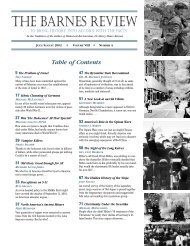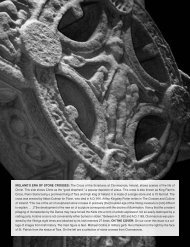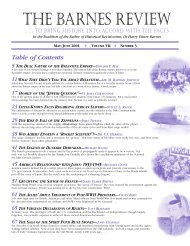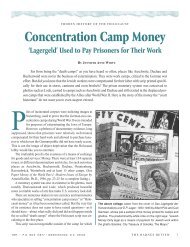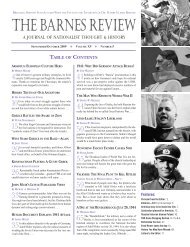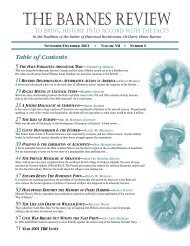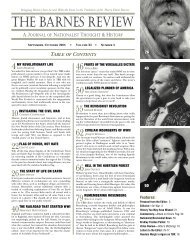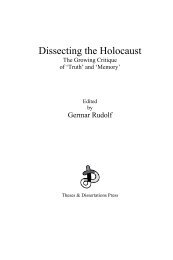Table of Contents - The Barnes Review
Table of Contents - The Barnes Review
Table of Contents - The Barnes Review
You also want an ePaper? Increase the reach of your titles
YUMPU automatically turns print PDFs into web optimized ePapers that Google loves.
political parties and sects within the church.<br />
In the Hellenic and Hellenized towns and cities <strong>of</strong> the<br />
empire there arose a civil duplication, two assemblies, two councils,<br />
two leaderships, the one set being <strong>of</strong> Christians and the<br />
other <strong>of</strong> pagans.<br />
For peace, the common good, and to halt sectarian doctrinal<br />
innovations, Constantine called for a great synod, the form <strong>of</strong><br />
which was modeled, on the one hand, after the senate <strong>of</strong> the<br />
republic and, on the other hand, after the synods <strong>of</strong> old among<br />
independent Hellenic city-states. <strong>The</strong> location was Nicaea (Isnik)<br />
at the southeast corner <strong>of</strong> the Bosporus.<br />
<strong>The</strong>re were 319 bishops and a multitude <strong>of</strong> priests, deacons<br />
and other clergymen attending; some bishops sent priests to<br />
represent them. Bishops may be likened to tribunes <strong>of</strong> the plebeians<br />
in old Rome. Constantine gave the imperial opening<br />
address in Latin, then took up his position as an observer, as did<br />
the consuls at the Roman senate. All sessions were conducted in<br />
Greek. At times he was in the discussions, too, in Greek.<br />
In a countering action, Massoretic Judaistic scholars in<br />
Persia, while manufacturing a new Massoretic Judaic religion,<br />
fabricated an allegedly re-constructed<br />
Hebrew Bible in order to<br />
abandon the use <strong>of</strong> Greek from their<br />
worship, as the bankers and Jews were<br />
sponsoring the de-Hellenizing <strong>of</strong> Persia as<br />
well. <strong>The</strong> forgery, dubbed “Original<br />
Hebrew,” in the 900s would be adopted by<br />
the Vatican and later by innumerable<br />
Protestant groupings. <strong>The</strong> Dead Sea<br />
Scrolls bear this out to be a forgery, intending<br />
to desensitize especially the prophetic<br />
matters fulfilled in Christ.<br />
<strong>The</strong> synod condemned the teachings<br />
<strong>of</strong> Bishop Arius <strong>of</strong> Alexandria, Egypt,<br />
an intellectualized sophist propagating<br />
his own sectarian views (e.g., that Christ<br />
is not God) and not being in conformance with the common ecclesiastic<br />
tradition and the chain <strong>of</strong> evidence. <strong>The</strong> synod admonished<br />
him to repent. Most bishops concurred with the findings,<br />
including those <strong>of</strong> Arian persuasion. Recalcitrant, Arius, with his<br />
leftover following, is excommunicated.<br />
Constantine, listening to the bishops, declared that Arius<br />
was influenced by Neoplatonism, a contrived synthesis <strong>of</strong><br />
Platonism and Zoroastrianism, used as another Jewish and<br />
bankers’ front, originally to de-Hellenize Persia. Those who say<br />
that Constantine was an Arian sympathizer forget that two<br />
years earlier he dispatched his friend, the orthodox Bishop <strong>of</strong><br />
Tarragona, Spain, to talk sense into Arius, who confounded<br />
Revelation with philosophy.<br />
Through Arianism a series <strong>of</strong> rebel nationalisms was<br />
expressed, cultivated and promoted in parallel with the resurgence<br />
<strong>of</strong> Latin provincial pagan traditionalisms and false<br />
“Hellenisms” <strong>of</strong> sectarian sophistry, all which led toward breaking<br />
up the empire. Arianism was tantamount to political sedition,<br />
seeded by the bankers to disrupt both church and empire.<br />
<strong>The</strong>ir technique for social and civic disruptions, including clogging<br />
the law courts with frivolous cases, bribing judges, tax farming,<br />
publicizing misinformation and panic peddling, were typical<br />
Jewish and Gnostic practices, then as now.<br />
<strong>The</strong> synod reaffirmed the Julian calendar with its mathe-<br />
50 N O V E M B E R / D E C E M B E R 2 0 0 3<br />
Arianism was tantamount to<br />
political sedition, seeded by<br />
the bankers to disrupt both<br />
church and empire. <strong>The</strong>ir<br />
technique for social and civic<br />
disruptions and panic<br />
peddling were typical gnostic<br />
practices, then as now.<br />
matics. It saw that the equinoxes were irregular year to year and<br />
did not fit with other celestial and terrestrial cycles. It rejected<br />
the notion for a wobbly tropical (i.e., the later Gregorian) calendar.<br />
It defined the formula for setting the variable date each year<br />
for the Pascha.<br />
<strong>The</strong> Jews in Persia at that time, oppositely, switched from<br />
a luni-Egyptian to an innovative luni-tropical calendar. <strong>The</strong><br />
Vatican would follow in about 1,300 years with its empirical solitropical<br />
Gregorian calendar to run neck to neck with the<br />
Massoretic luni-tropical over the centuries. Any form <strong>of</strong> tropical<br />
calendar derives directly from sun worshiping.<br />
Imaginative, incongruous and false books, having crept in<br />
as allegedly belonging to Holy Writ, were purged by the synod.<br />
No editorial additions to Holy Writ were made. In other words,<br />
the great synod was an international hearing for investigating<br />
with legal and dialectic acumen the chain <strong>of</strong> evidence <strong>of</strong> all that<br />
concerns Christ.<br />
<strong>The</strong> synod succinctly extracted evidence and defined in a<br />
creed the nature <strong>of</strong> Christ in relation to the Father, in answer to<br />
Arius. A future synod, in A.D. 381, in answer to the compromised<br />
followers <strong>of</strong> Arius, would research and complete the statement on<br />
the Holy Trinity by defining the Holy<br />
Spirit, as well as defining church, baptism<br />
and life eternal. Called the Nicene Creed,<br />
or the symbol <strong>of</strong> faith, the 12 articles<br />
there<strong>of</strong> briefly, mystically and succinctly<br />
express the faith.<br />
<strong>The</strong> emperor mildly and prudently<br />
admonished the bishops to avoid factionalism<br />
and argumentativeness with one<br />
another, to forgive human frailties, to be<br />
careful not to give cause to those seeking<br />
to ridicule the Church, and concluded,<br />
“You are bishops in the church; I am bishop<br />
outside the church, ordained by God.”<br />
<strong>The</strong> classic usage <strong>of</strong> “bishop” means<br />
“supervisor,” an assigned position <strong>of</strong> responsibility<br />
over others. <strong>The</strong> phrase “ordained by God,” is that<br />
God holds him responsible now that he is emperor and, accordingly,<br />
God holds the bishops in the church responsible.<br />
<strong>The</strong> world outlook <strong>of</strong> the great synod is for unity in the civilized<br />
world to be above other loyalties. Bishops not<br />
attending, being apprised, deliver their signatures, as<br />
did those <strong>of</strong> Alexandria, <strong>of</strong> Rome, and the former Arian<br />
Eusebius <strong>of</strong> Nicomedia. Constantine writes to the king <strong>of</strong><br />
Persia, “With the help <strong>of</strong> God I come forth to bring peace and<br />
prosperity in all lands.” That is, he was <strong>of</strong>fering a universal concord<br />
against the banks. A universal second synod in 381 would<br />
ratify this first and dispel doubts for posterity on any political or<br />
financial manipulations.<br />
Constantine soon returned to Rome where he found an<br />
atmosphere less friendly toward Christianity, a contrivedly<br />
paganizing capital for a grassroots Christianizing empire. Yet he<br />
broke no law <strong>of</strong> Rome. He assumed neither authority nor the<br />
impiety to overthrow the senate and Roman tradition. Besides<br />
the ongoing conspiracies to keep society destabilized, it appears,<br />
the bankers with their Jewish tools tried getting at him personally.<br />
Many <strong>of</strong> his own family are involved.<br />
Ought Constantine to have resigned and lived as a pious<br />
Christian? God granted him, he believed, the position to keep



